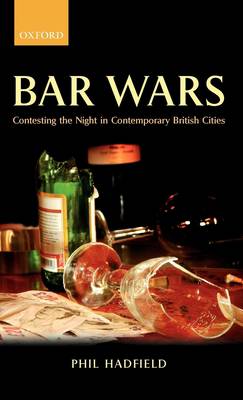
- Retrait gratuit dans votre magasin Club
- 7.000.000 titres dans notre catalogue
- Payer en toute sécurité
- Toujours un magasin près de chez vous
- Retrait gratuit dans votre magasin Club
- 7.000.000 titres dans notre catalogue
- Payer en toute sécurité
- Toujours un magasin près de chez vous
225,95 €
+ 451 points
Format
Description
In Britain today, if you are in the business of fighting crime, then you have to be in the business of dealing with alcohol. 'Binge drinking' culture is intrinsic to urban leisure and has come to pose a key threat to public order. Unsurprisingly, a struggle is occurring. Pub and club companies, local authorities, central government, the police, the judiciary, local residents, and revelers, all hold variously competing notions of night-time social order and the uses and meanings of public and private space. Bar Wars explores the issue of contestation within and between these groups. Located within a long tradition of urban ethnography, the book offers unique and hard-hitting analyses of social control in bars and clubs, courtroom battles between local communities and the drinks industry, and street-level policing, These issues go the heart of contemporary debates on anti-social behavior and were hotly debated during the development of the Licensing Act 2003 and its contentious passage through Parliament. The book presents a controversial critique of recent shifts in national alcohol policy. It uses historical, documentary, interview, and observational methods to chart the emergence of the 'night-time high street, ' a social environment set aside for the exclusive purposes of mass hedonistic consumption, and describes the political and regulatory struggles that help shape important aspects of urban life. The book identifies the adversarial licensing trial as a key arena of contestation and describes how leisure corporations and their legal champions circumvent regulatory control in courtroom duels with subordinate opponents. The author's experiences as an expert witness to the licensing courts provide a unique perspective, setting his work apart from other academic commentators. Bar Wars takes the study of the night-time economy to a new level of sophistication, making it essential reading for all those wishing to understand the governance of crime and social order in contemporary cities
Spécifications
Parties prenantes
- Auteur(s) :
- Editeur:
Contenu
- Nombre de pages :
- 344
- Langue:
- Anglais
- Collection :
Caractéristiques
- EAN:
- 9780199297856
- Date de parution :
- 03-02-07
- Format:
- Livre relié
- Format numérique:
- Genaaid
- Dimensions :
- 140 mm x 216 mm
- Poids :
- 576 g







